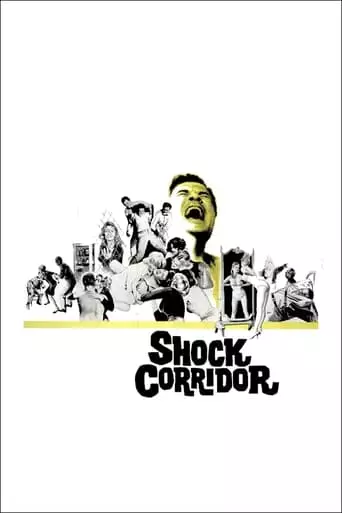
Shock Corridor (1963) Watch Online Free
With the help of his girlfriend Cathy and Dr. Fong, a psychiatrist, ambitious journalist Johnny Barrett poses as a madman in order to be admitted to a mental institution where a bloody murder has been committed.
Shock Corridor (1963), directed by Samuel Fuller, is a psychological thriller that explores the complex themes of mental illness, societal decay, and the human psyche. The story follows Johnny Barrett, an ambitious journalist who checks himself into a mental hospital under the guise of being insane in order to solve a high-profile murder case. The murder was committed by a man who is now locked away in the hospital, and Johnny believes that by gaining access to the patients, he will be able to extract a confession.
As Johnny delves deeper into the hospital’s dark and disturbing world, he becomes increasingly unstable, and his own mental health begins to deteriorate. His journey is complicated by the presence of other patients who have been deeply scarred by their own traumatic experiences. These include Trent, a man haunted by the brutalities of racism, and Boden, a scientist who has regressed to the mentality of a child after witnessing the destructive power of nuclear weapons. Johnny’s investigation ultimately leads to the discovery that the murderer is Wilkes, a hospital attendant involved in a cover-up.
The film is a grim and intense exploration of how personal and societal trauma can affect the mind. Johnny’s quest for truth and his descent into madness serve as a stark commentary on the fragility of the human condition, as well as the moral and psychological consequences of pursuing truth at any cost.
Shock Corridor is a powerful critique of the 1960s American society, using the mental hospital as a microcosm for the larger societal issues of the time. Fuller tackles controversial subjects such as racism, the fear of nuclear warfare, and the effects of social isolation, presenting them through the lens of mental illness. The hospital, with its confined spaces and chaotic environment, becomes a symbol for the fragmented psyche of the characters, as well as the fractured nature of American society.
The film’s portrayal of mental illness is raw and unflinching, offering a stark contrast to the more sanitized depictions common in Hollywood at the time. By showing the devastating effects of trauma on the human mind, Fuller challenges viewers to reconsider their perceptions of mental health. The film’s narrative structure, which blurs the line between reality and delusion, reflects the disorienting effects of psychological breakdown and the difficulty of distinguishing truth from illusion
After watching Shock Corridor, viewers are likely to experience a mix of unease and introspection. The film’s intense psychological themes and unflinching portrayal of mental illness can be unsettling, but they also provoke deep thought about the fragility of the human mind and the societal forces that shape it. The film’s exploration of the blurred line between reality and delusion may leave you questioning the nature of truth and perception.
The tragic fate of the protagonist, Johnny Barrett, will likely evoke feelings of sympathy and sorrow, as his quest for truth leads to his own psychological collapse. The film’s dark, gritty atmosphere and its exploration of the inner workings of the human mind will linger long after the credits roll, leaving you to ponder the implications of the story on both a personal and societal level
